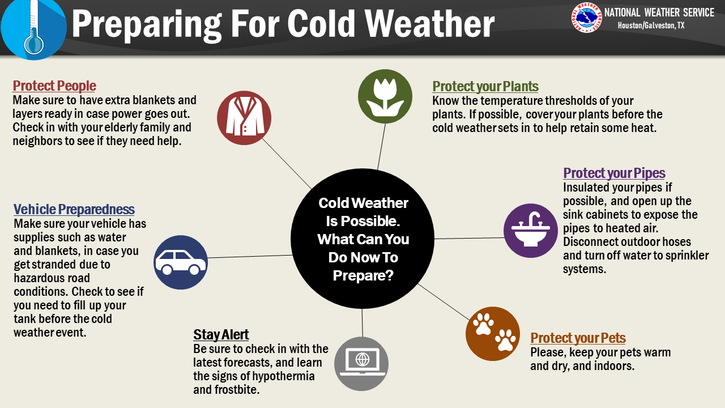Preparing For Drier Weather: Tips And Advice

Table of Contents
Water Conservation Strategies for Drier Weather
Conserving water during drier weather is crucial, both for environmental reasons and to ensure you have enough for essential needs. Implementing water-wise practices can significantly reduce your water footprint and help you weather dry spells more effectively.
Optimizing Outdoor Water Usage
Water-wise gardening is essential during dry periods. Choosing the right plants and employing efficient irrigation techniques can dramatically reduce water consumption in your yard.
-
Drought-tolerant landscaping: Opt for native plants and xeriscaping techniques, which require minimal watering. These plants are naturally adapted to drier conditions and will thrive with less water.
-
Efficient irrigation: Replace sprinklers with soaker hoses or drip irrigation systems. These methods deliver water directly to the roots of plants, minimizing evaporation and runoff.
-
Regular maintenance: Check for leaks in your pipes and sprinklers regularly. A small leak can waste a surprising amount of water over time.
-
Deep, infrequent watering: Water deeply but less frequently to encourage deep root growth, making plants more resilient to dry conditions.
-
Rainwater harvesting: Install a rain barrel to collect rainwater for later use in watering your garden. This reduces your reliance on municipal water supplies.
-
Adjusting lawnmower height: Raise your lawnmower blade to a higher setting. Taller grass shades the soil, reducing evaporation and moisture loss.
Reducing Indoor Water Consumption
Conserving water isn't just about the outdoors; indoor water usage accounts for a significant portion of your overall consumption.
- Low-flow fixtures: Install low-flow showerheads, faucets, and toilets to reduce water usage without sacrificing performance. These fixtures are readily available and can significantly reduce your water bill.
- Repair leaks promptly: A leaky faucet or toilet can waste gallons of water over time. Address leaks immediately to prevent unnecessary water loss.
- Greywater recycling: Where appropriate and permitted, consider using greywater (water from showers and sinks) to water your plants. This is a sustainable way to conserve potable water.
- Mindful usage: Be conscious of your water usage during everyday tasks like brushing your teeth or washing dishes. Turn off the tap while you brush and wash dishes in a basin instead of under running water.
Protecting Your Home and Property from Dry Weather
Drier weather presents unique challenges to your home and property, increasing the risk of fire and structural damage. Taking proactive steps to mitigate these risks is essential.
Fire Safety Precautions
The risk of wildfires increases significantly during prolonged dry spells. Creating defensible space around your home is paramount.
- Defensible space: Clear dry leaves, brush, and other flammable materials from around your house and property. Maintain a perimeter of at least 30 feet of defensible space.
- Landscaping maintenance: Regularly trim trees and shrubs, especially those overhanging your house or near power lines. Properly maintained landscaping reduces the risk of fire spreading to your home.
- Safe storage: Store flammable materials, such as propane tanks and gasoline, away from your house and in designated areas.
- Evacuation plan: Develop and practice a fire evacuation plan for your family, including escape routes and meeting points.
Preventing Dry Weather Damage to Your Home
Dry weather can lead to various structural problems, from foundation cracks to dry rot. Regular inspections and preventative maintenance can help prevent costly repairs.
- Regular inspections: Inspect your home's exterior regularly for cracks in the foundation, walls, or roof. Pay attention to signs of damage, such as settling or warping.
- Seal cracks and gaps: Seal any cracks or gaps in your foundation, walls, or windows to prevent moisture loss and pest infestation. Caulking is an effective and affordable solution.
- Professional inspections: Consider scheduling professional inspections of your home's structure periodically, especially in areas prone to dry weather damage.
Personal Health and Well-being During Drier Weather
Protecting your personal health and well-being is crucial during periods of dry weather. Dehydration and sun exposure are significant risks.
Staying Hydrated
Maintaining adequate hydration is vital, especially during hot, dry conditions. Dehydration can lead to fatigue, headaches, and other health problems.
- Carry a water bottle: Always carry a reusable water bottle and refill it throughout the day.
- Drink proactively: Don't wait until you feel thirsty to drink water. Thirst is a sign that you are already dehydrated.
- Hydrating foods: Consume plenty of fruits and vegetables, which contain high water content.
Protecting Yourself from Sun Exposure
Sun exposure is a serious concern during drier weather. Prolonged sun exposure can lead to sunburn, heatstroke, and other health complications.
- Sunscreen: Use sunscreen with a high SPF (at least 30) and reapply it regularly, especially after swimming or sweating.
- Protective clothing: Wear protective clothing, such as a wide-brimmed hat, sunglasses, and long sleeves, to minimize sun exposure.
- Limit outdoor activities: Limit strenuous outdoor activities during the hottest parts of the day. Schedule outdoor tasks for the cooler morning or evening hours.
- Seek shade: Whenever possible, seek shade to reduce your exposure to direct sunlight.
Conclusion
Preparing for drier weather involves a multifaceted approach encompassing water conservation, home protection, and personal well-being. By implementing the water conservation strategies outlined above, you can significantly reduce your water consumption. Protecting your home from fire and structural damage requires regular maintenance and proactive measures. Finally, prioritizing your personal health by staying hydrated and protecting yourself from sun exposure is essential for well-being during drier weather conditions. Start planning your drier weather preparedness strategy today! Effective drier weather preparedness means mitigating risks and ensuring your comfort and safety during these challenging conditions. Start implementing these tips to better prepare for drier weather now.

Featured Posts
-
 Towards Zero Episode 1 Exploring The Absence Of Murder
May 20, 2025
Towards Zero Episode 1 Exploring The Absence Of Murder
May 20, 2025 -
 Going Solo A Guide To Planning Your Independent Adventure
May 20, 2025
Going Solo A Guide To Planning Your Independent Adventure
May 20, 2025 -
 Zoey Starks Injury Details From Wwe Raw Match
May 20, 2025
Zoey Starks Injury Details From Wwe Raw Match
May 20, 2025 -
 Analyzing The Ftv Live Hell Of A Run A Critical Perspective
May 20, 2025
Analyzing The Ftv Live Hell Of A Run A Critical Perspective
May 20, 2025 -
 Solve The Nyt Mini Crossword February 25th Answers
May 20, 2025
Solve The Nyt Mini Crossword February 25th Answers
May 20, 2025
